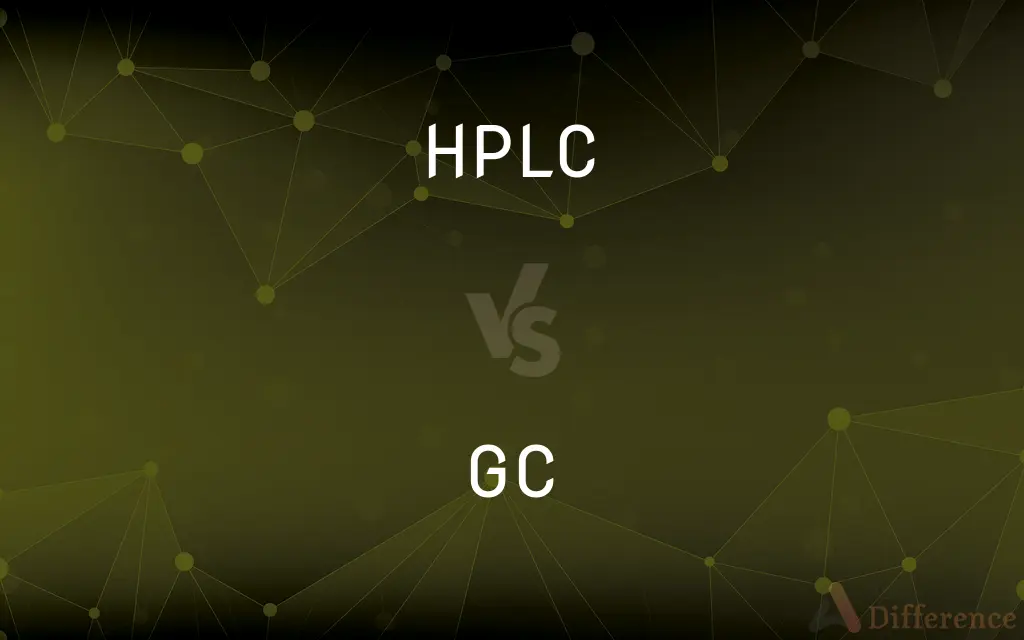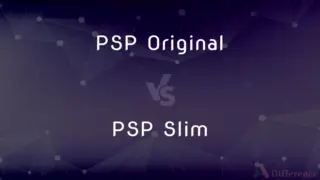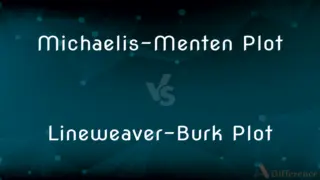HPLC vs. GC — What's the Difference?
By Urooj Arif & Maham Liaqat — Published on February 20, 2024
HPLC (High-Performance Liquid Chromatography) separates compounds in liquid phase. GC (Gas Chromatography) separates volatile substances in gas phase.

Difference Between HPLC and GC
Table of Contents
ADVERTISEMENT
Key Differences
HPLC (High-Performance Liquid Chromatography) and GC (Gas Chromatography) are both chromatographic techniques used to separate, identify, and quantify components in a mixture. HPLC operates in the liquid phase where the sample is passed through a column containing solid adsorbent material under high pressure. It is versatile in its ability to analyze a wide range of compounds, including those that are non-volatile, thermally unstable, or have high molecular weights.
GC, on the other hand, is used for separating and analyzing compounds that can be vaporized without decomposition. Samples are carried by an inert gas through a coated glass or metal column. GC is particularly effective for volatile and thermally stable compounds. The choice between GC and HPLC depends on the physical and chemical properties of the sample to be analyzed.
HPLC offers the advantage of analyzing a broader variety of samples because it does not require the sample to be volatile or thermally stable. It can be used with a wide range of detection methods, making it suitable for detecting compounds at very low concentrations. HPLC is widely used in pharmaceuticals, environmental monitoring, and food analysis.
GC is highly efficient for separating and analyzing small organic molecules and offers superior resolution. It requires smaller sample sizes and provides faster analysis times compared to HPLC. GC is extensively used in petrochemical analysis, forensic science, and the detection of environmental pollutants.
Both HPLC and GC are essential tools in analytical chemistry, each with its specific applications based on the nature of the compounds to be analyzed. While HPLC is preferred for its versatility and ability to analyze non-volatile compounds, GC is favored for its efficiency in analyzing volatile substances.
ADVERTISEMENT
Comparison Chart
Phase
Liquid
Gas
Sample Type
Non-volatile, thermally unstable
Volatile, thermally stable
Pressure
High pressure required
Operates under standard pressure
Application
Pharmaceuticals, food analysis
Petrochemicals, environmental pollutants
Detection
UV, fluorescence, mass spectrometry
Flame ionization, mass spectrometry
Compare with Definitions
HPLC
Utilizes high pressure to push solvents through a column.
The high pressure in HPLC allows for faster analysis times.
GC
Uses an inert gas as the mobile phase.
Helium is often the carrier gas of choice in GC due to its inertness.
HPLC
Versatile in application across various industries.
Food safety laboratories rely on HPLC for contaminant testing.
GC
Offers high resolution and fast separation.
GC provided clear separation of all the components within minutes.
HPLC
Analyzes non-volatile and polar compounds effectively.
HPLC was used to quantify vitamins in dietary supplements.
GC
Effective for analyzing environmental pollutants.
GC was crucial in detecting pesticides in water samples.
HPLC
Separation technique using liquid mobile phase.
HPLC is ideal for purifying complex pharmaceutical compounds.
GC
Requires compounds to be vaporized for analysis.
The sample was heated until vaporized before GC analysis.
HPLC
Compatible with a wide range of detectors.
We used a UV detector in our HPLC analysis for better sensitivity.
GC
Analytical method for separating volatile compounds.
GC is commonly used in the fragrance industry to identify scent components.
Common Curiosities
What does GC stand for?
Gas Chromatography.
What does HPLC stand for?
High-Performance Liquid Chromatography.
Can HPLC analyze gases?
No, HPLC is used for liquid or dissolved samples.
Is GC suitable for high molecular weight compounds?
Generally, no. GC is best for small, volatile molecules.
How does temperature affect HPLC and GC analyses?
In HPLC, temperature can affect solvent viscosity and separation; in GC, the column temperature directly influences vaporization and separation of compounds.
Which is faster, HPLC or GC?
GC often offers faster analysis times due to quicker separation of volatile compounds.
Are HPLC and GC quantitative or qualitative methods?
Both can be used for quantitative and qualitative analysis, depending on the detectors used.
What types of detectors are used in HPLC?
UV-Visible, fluorescence, and mass spectrometry detectors, among others.
What is the role of the mobile phase in HPLC?
The mobile phase in HPLC is a solvent or mixture of solvents that carries the sample through the column.
Why is inert gas used in GC?
Inert gas is used as the carrier to prevent any possible chemical reaction that might alter the sample.
What are the main applications of GC?
GC is used in forensic science, petrochemical industry, and for environmental monitoring.
Can water be used as a solvent in GC?
No, water cannot be used in GC due to its non-volatile nature.
Can HPLC separate volatile compounds?
Yes, but non-volatile or thermally unstable compounds are more typically analyzed using HPLC.
Can both HPLC and GC be used for the same sample?
While some samples can be analyzed by both methods, the choice depends on the sample's chemical properties and the analysis's objective. Typically, they are used for different types of compounds due to their distinct operational principles.
Share Your Discovery

Previous Comparison
PSP Original vs. PSP Slim
Next Comparison
Michaelis-Menten Plot vs. Lineweaver-Burk PlotAuthor Spotlight
Written by
Urooj ArifUrooj is a skilled content writer at Ask Difference, known for her exceptional ability to simplify complex topics into engaging and informative content. With a passion for research and a flair for clear, concise writing, she consistently delivers articles that resonate with our diverse audience.
Co-written by
Maham Liaqat















































